
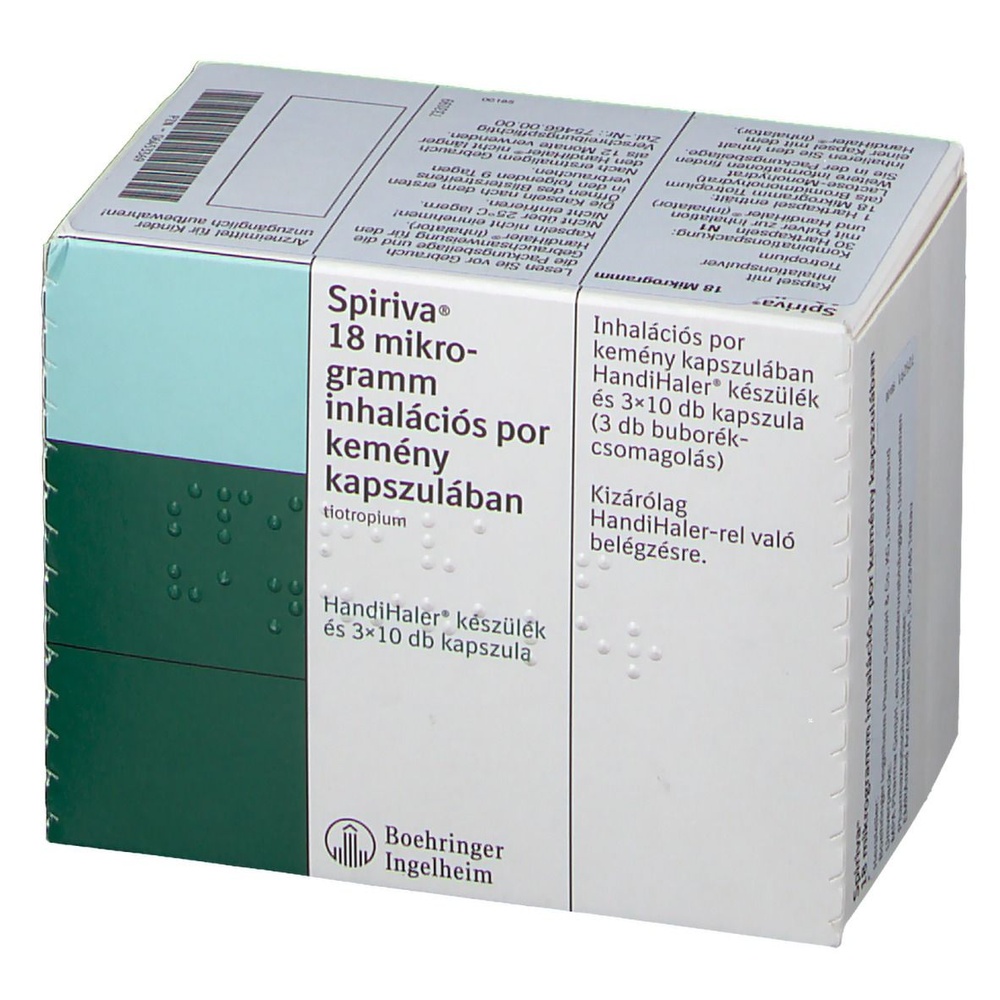
Spiriva

Ask a doctor about a prescription for Spiriva

How to use Spiriva
Leaflet accompanying the packaging: patient information
Spiriva
18 micrograms/dose, inhalation powder in hard capsules
Tiotropium
Read the leaflet carefully before using the medicine, as it contains important information for the patient.
- -Keep this leaflet, you may need to read it again.
- -If you have any further questions, ask your doctor or pharmacist.
- -This medicine has been prescribed for you only. Do not pass it on to others. It may harm them, even if their symptoms are the same as yours.
- -If you experience any side effects, including any not listed in this leaflet, please tell your doctor or pharmacist. See section 4.
Table of contents of the leaflet
- 1. What is Spiriva and what is it used for
- 2. Important information before using Spiriva
- 3. How to use Spiriva
- 4. Possible side effects
- 5. How to store Spiriva
- 6. Contents of the pack and other information
1. What is Spiriva and what is it used for
Spiriva makes it easier for people with chronic obstructive pulmonary disease (COPD) to breathe. COPD is a chronic lung disease that causes shortness of breath and coughing. The name COPD is associated with chronic bronchitis and emphysema. COPD is a chronic disease, so Spiriva should be taken every day, not just when breathing problems or other COPD symptoms occur. Spiriva is a long-acting bronchodilator that helps to widen the airways and make it easier for air to get in and out of the lungs. Regular use of Spiriva can also help reduce persistent shortness of breath associated with the disease and help reduce the impact of the disease on daily life. Taking Spiriva every day will also help prevent sudden, short-term worsening of COPD symptoms, which can last for several days. The effect of the medicine lasts for 24 hours, so it should only be taken once a day. For information on the correct dosage and how to use Spiriva, see section 3. How to use Spiriva, and the HandiHaler inhaler instruction manual, which can be found at the end of the leaflet.
2. Important information before using Spiriva
When not to use Spiriva
- If you are allergic (hypersensitive) to tiotropium, the active substance of the medicine, or any of the other ingredients of this medicine (listed in section 6) or lactose monohydrate, which contains milk protein.
- If you are allergic (hypersensitive) to atropine or its derivatives, such as ipratropium or oxytropium.
- If you are under 18 years old.
Warnings and precautions
Before starting to use Spiriva, discuss it with your doctor or pharmacist.
- You should contact your doctor if you have increased intraocular pressure (narrow-angle glaucoma), prostate problems, or difficulty urinating.
- You should contact your doctor if you have kidney problems.
- Spiriva 18 micrograms is indicated for the treatment of chronic obstructive pulmonary disease. It should not be used to treat sudden attacks of shortness of breath or wheezing.
- When using Spiriva, immediate hypersensitivity reactions, such as rash, swelling, itching, wheezing, or shortness of breath, may occur. In such cases, you should contact your doctor immediately.
- As with other inhaled medicines, after using Spiriva, some patients may experience a feeling of chest tightness, coughing, wheezing, or shortness of breath. In such cases, you should contact your doctor immediately.
- Do not allow tiotropium bromide to get into your eyes, as it may cause the occurrence or worsening of glaucoma symptoms, which is an eye disease. Eye pain or discomfort, blurred vision, seeing a rainbow-colored ring around a light source, or changes in color vision, along with eye redness, may be signs of acute glaucoma. Eye disorders may be accompanied by headache, nausea, and vomiting. If glaucoma symptoms occur, stop using tiotropium bromide and contact your doctor immediately, preferably an ophthalmologist.
- Dryness of the mucous membrane of the mouth, which occurs during the use of the medicine, related to its anticholinergic effect, may cause tooth decay over time, so it is essential to maintain oral hygiene.
- If you have had a heart attack in the last 6 months or have had unstable or life-threatening heart rhythm disorders in the last year, inform your doctor. Your doctor will decide whether Spiriva can be used.
- Spiriva should not be used more than once a day.
Children and adolescents
Spiriva is not recommended for children and adolescents under 18 years old.
Spiriva and other medicines
Tell your doctor or pharmacist about all medicines you are currently taking or have recently taken, as well as those that are available without a prescription. In particular, inform your doctor or pharmacist about other medicines used to treat lung disease, such as ipratropium or oxytropium. No interactions have been reported when taking Spiriva with other medicines used to treat COPD, such as inhaled medicines used as needed, e.g., salbutamol, methylxanthines (e.g., theophylline), and/or oral and inhaled steroids, e.g., prednisolone.
Pregnancy, breastfeeding, and fertility
Before using any medicine, consult your doctor. If you are pregnant or think you may be pregnant, or if you are breastfeeding, you should not use this medicine unless your doctor has explicitly recommended it.
Driving and using machines
If you experience dizziness, blurred vision, or headache, do not drive or operate machinery.
Spiriva contains lactose monohydrate
When using the medicine as recommended, i.e., one capsule per day, each dose of the medicine provides 5.5 mg of lactose monohydrate. If you have previously been diagnosed with intolerance to some sugars or an allergy to milk proteins (which may be present in small amounts in the lactose monohydrate ingredient of this medicine), you should contact your doctor before taking the medicine.
3. How to use Spiriva
Spiriva should always be used as directed by your doctor. If you are unsure, consult your doctor or pharmacist. It is recommended to inhale the contents of one capsule (18 micrograms of tiotropium) once a day. Do not use more than the recommended dose. Take the capsule at the same time every day. This is important because Spiriva works for 24 hours.
Capsules are for inhalation only. Do not swallow.
Do not swallow the capsules. After placing the Spiriva capsule in the HandiHaler inhaler, press the piercing button to pierce the capsule, allowing you to inhale the medicine. Make sure you have the HandiHaler inhaler and use it correctly. Read the instruction manual for the HandiHaler inhaler, which can be found at the end of the leaflet. Make sure not to exhale into the HandiHaler inhaler. If you have any difficulties with using the HandiHaler inhaler, contact your doctor, nurse, or pharmacist. The inhaler should be cleaned once a month. The cleaning instructions can be found at the end of the leaflet, see "HandiHaler inhaler instruction manual". Do not allow Spiriva to get into your eyes, as it may cause blurred vision, eye pain, or eye redness. If the medicine gets into your eye, rinse it immediately with warm water and consult your doctor for further advice. If you feel that your breathing difficulties are worsening, contact your doctor as soon as possible.
Use in children and adolescents
Spiriva is not recommended for children and adolescents under 18 years old.
Using more than the recommended dose of Spiriva
If you use more than the recommended dose of Spiriva (more than one capsule per day), contact your doctor immediately. You may be at increased risk of side effects, such as dryness of the mouth, constipation, difficulty urinating, rapid heartbeat, or blurred vision.
Missing a dose of Spiriva
If you miss a dose, take it as soon as possible. Never take two doses at the same time or on the same day to make up for a missed dose. In such cases, skip the missed dose and continue with the treatment as before. Take the next dose at the usual time.
Stopping the use of Spiriva
Before stopping the use of Spiriva, consult your doctor or pharmacist. After stopping the use of Spiriva, COPD symptoms may worsen. If you have any further questions about using this medicine, consult your doctor or pharmacist.
4. Possible side effects
Like all medicines, Spiriva can cause side effects, although not everybody gets them. The frequency of side effects is defined as follows: Common: occurs in 1 to 10 people out of 100 Uncommon: occurs in 1 to 10 people out of 1,000 Rare: occurs in 1 to 10 people out of 10,000 Frequency not known: frequency cannot be estimated from the available data The following side effects have been reported by patients using Spiriva. Side effects are listed according to their frequency: common, uncommon, rare, or frequency not known.
Common:
- Dryness of the mouth (usually mild)
Uncommon:
- Dizziness
- Headache
- Taste disturbances
- Blurred vision
- Irregular heartbeat (atrial fibrillation)
- Pharyngitis
- Hoarseness (dysphonia)
- Cough
- Gastroesophageal reflux disease, which may cause heartburn
- Constipation
- Fungal infections of the mouth and throat (oral thrush)
- Rash
- Difficulty urinating (urinary retention)
- Painful or difficult urination
Rare:
- Difficulty sleeping (insomnia)
- Seeing a rainbow-colored ring around a light source or changes in color vision, along with eye redness (glaucoma)
- Increased eye pressure
- Irregular heartbeat (supraventricular tachycardia)
- Rapid heartbeat (tachycardia)
- Pounding heart
- Chest tightness associated with coughing, wheezing, or shortness of breath occurring immediately after inhaling the medicine (bronchospasm)
- Nosebleeds
- Laryngitis
- Sinusitis
- Intestinal obstruction or lack of bowel movements (intestinal obstruction, including paralytic ileus)
- Gingivitis
- Glossitis
- Difficulty swallowing (dysphagia)
- Stomatitis
- Nausea
- Hypersensitivity, including immediate reactions
- Severe allergic reaction, which may cause swelling of the face or throat (angioedema)
- Hives
- Itching (pruritus)
- Urinary tract infections
Frequency not known:
- Dehydration
- Tooth decay
- Severe allergic reactions (anaphylactic reactions)
- Infections or ulcers of the skin
- Dry skin
- Joint swelling
Severe side effects, such as allergic reactions, which may cause swelling of the face or throat (angioedema), or other hypersensitivity reactions (such as a sudden drop in blood pressure or dizziness) may occur alone or as part of a severe allergic reaction (anaphylactic reaction) after using Spiriva. Additionally, as with other inhaled medicines, some patients may experience unexpected chest tightness, coughing, wheezing, or shortness of breath immediately after inhaling the medicine (bronchospasm). If you experience any of these symptoms, contact your doctor immediately.
Reporting side effects
If you experience any side effects, including any not listed in this leaflet, please tell your doctor or pharmacist, or nurse. Side effects can be reported directly to the Department of Adverse Reaction Monitoring of Medicinal Products, Medical Devices, and Biocidal Products: Al. Jerozolimskie 181C, 02-222 Warsaw, tel.: 22 49-21-301, fax: 22 49-21-309, website: https://smz.ezdrowie.gov.pl Side effects can also be reported to the marketing authorization holder or its representative. By reporting side effects, you can help provide more information on the safety of the medicine.
5. How to store Spiriva
Keep the medicine out of the sight and reach of children. Store in a temperature below 25°C. Do not freeze. The shelf life of the medicine after opening the blister pack: 9 days. After removing the first capsule from the blister pack, use the capsules from the same blister pack for the next 9 days, one capsule per day. The HandiHaler inhaler should be discarded after 12 months from the first use. Do not use this medicine after the expiry date (EXP) stated on the carton and blister pack. The expiry date refers to the last day of the month. Medicines should not be disposed of via wastewater or household waste. Ask your pharmacist how to dispose of medicines that are no longer needed. This will help protect the environment.
6. Contents of the pack and other information
What Spiriva contains
The active substance of the medicine is tiotropium. Each capsule contains 18 micrograms of tiotropium (as tiotropium bromide monohydrate micronized). The delivered dose (released from the HandiHaler inhaler mouthpiece) contains 10 micrograms of tiotropium. The other ingredients are lactose monohydrate micronized, lactose monohydrate 200 M. The ingredients of the capsule shell are gelatin, macrogol 3350, titanium dioxide (E171), yellow iron oxide (E 172), indigo carmine (E 132).
What Spiriva looks like and contents of the pack
Spiriva is a hard, light green capsule containing inhalation powder. Each capsule is printed with the code TI 01 and the company logo. Spiriva is available in the following packs:
- -30 capsules
- -30 capsules and HandiHaler inhaler
- -90 capsules
In addition, a pack containing the HandiHaler inhaler is available for sale. Not all pack sizes may be marketed.
Marketing authorization holder and manufacturer
Marketing authorization holder Boehringer Ingelheim International GmbH Binger Strasse 173 55216 Ingelheim/Rhein Germany Manufacturer Boehringer Ingelheim Pharma GmbH & Co. KG Binger Strasse 173 55216 Ingelheim/Rhein Germany Boehringer Ingelheim France 100-104 avenue de France 75013 Paris France For further information, please contact the marketing authorization holder's representative. Poland Boehringer Ingelheim Sp. z o.o. Tel.: +48 22 699 0 699
Date of last revision of the leaflet:
HandiHaler inhaler instruction manual
HandiHaler is an inhaler that allows you to inhale the Spiriva medicine prescribed by your doctor for breathing difficulties. The HandiHaler inhaler is designed only for Spiriva capsules. Do not use it to administer other medicines. The HandiHaler inhaler is intended for use by one patient only and is designed for multiple use.
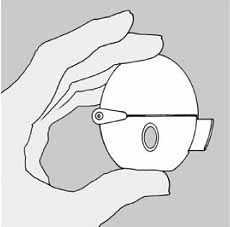 | Follow your doctor's instructions for using Spiriva. After the first use, the HandiHaler inhaler can be used for a period of one year to administer the medicine. |
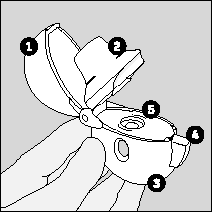 | HandiHaler
|
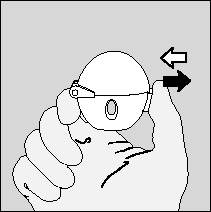 |
|
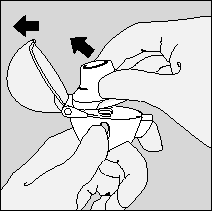 |
|
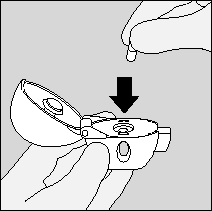 |
|
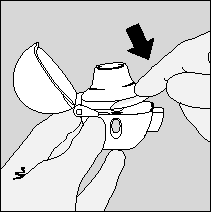 |
|
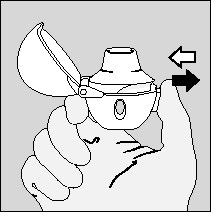 |
|
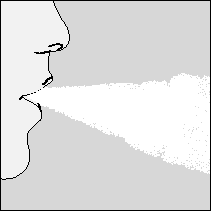 |
|
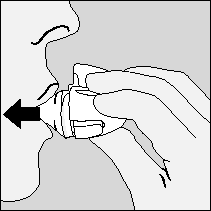 |
|
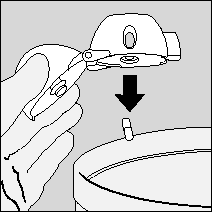 |
|
Cleaning the HandiHaler inhaler
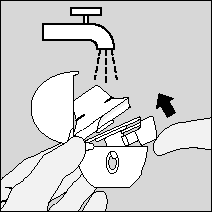 | The HandiHaler inhaler should be cleaned once a month. Open the upper cap and mouthpiece, and then lift the piercing button to open the body with the window. Remove any powder residue by rinsing the entire inhaler with warm water. Shake off excess water, and then leave the inhaler open to air dry on a paper towel. It takes about 24 hours to dry completely, so it is best to wash the inhaler immediately after use so that it is ready for the next dose. If necessary, the outer part of the mouthpiece can be wiped with a damp, but not wet, cloth. |
Removing a capsule from the blister pack
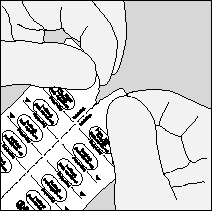 |
|
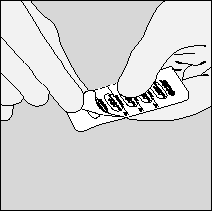 |
|
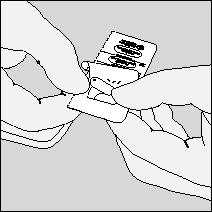 |
|
The Spiriva capsule contains only a small amount of inhalation powder, so it is not fully filled.
- Country of registration
- Active substance
- Prescription requiredYes
- Manufacturer
- ImporterBoehringer Ingelheim France Boehringer Ingelheim Pharma GmbH & Co. KG
- This information is for reference only and does not constitute medical advice. Always consult a licensed doctor before taking any medication. Oladoctor is not responsible for medical decisions based on this content.
- Alternatives to SpirivaDosage form: Powder, 18 mcgActive substance: tiotropium bromideManufacturer: Ferrer Internacional, S.A.Prescription requiredDosage form: Powder, 10 mcgActive substance: tiotropium bromideManufacturer: Actavis Ltd. Laboratorios Liconsa S.A. Teva Operations Poland Sp. z o.o. Teva Pharma B.V.Prescription requiredDosage form: Powder, 18 mcg/measured doseActive substance: tiotropium bromidePrescription required
Alternatives to Spiriva in other countries
The best alternatives with the same active ingredient and therapeutic effect.
Alternative to Spiriva in Ucrania
Alternative to Spiriva in España
Online doctors for Spiriva
Discuss dosage, side effects, interactions, contraindications, and prescription renewal for Spiriva – subject to medical assessment and local rules.














